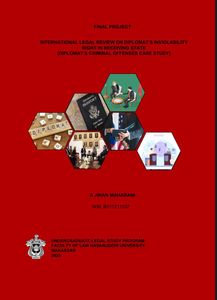MAHARANI, A. JIHAN (2025) TINJAUAN HUKUM INTERNASIONAL TENTANG HAK DIPLOMAT YANG TIDAK DAPAT DIGANGGU DI NEGARA PENERIMA (STUDI KASUS TINDAK PIDANA DIPLOMAT) = INTERNATIONAL LEGAL REVIEW ON DIPLOMAT’S INVIOLABILITY RIGHT IN RECEIVING STATE (DIPLOMAT’S CRIMINAL OFFENSES CASE STUDY). Skripsi thesis, Universitas Hasanuddin.
![[thumbnail of Cover]](/48906/1.hassmallThumbnailVersion/B011211037-Cover.jpeg)

B011211037-Cover.jpeg
Download (57kB) | Preview
B011211037-1-2.pdf
Download (361kB)
B011211037-dp.pdf
Download (112kB)
B011211037-full.pdf
Restricted to Repository staff only until 21 February 2027.
Download (1MB)
Abstract (Abstrak)
Background. Diplomatic immunity is a special right that can be obtained by a diplomat in receiving state. However, when such offences occurs, this special right will lead the diplomat to a inviolability and cannot be liable. This study aims to reveal the diplomatic immunity rights in the context of criminal acts committed by diplomats in receiving countries. Using a normative legal approach, this study examines applicable legal rules, including the 1961 Vienna Convention on Diplomatic Relations, national regulations, and various relevant cases. This study also explores the principles of international law governing diplomatic immunity rights and their limitations in criminal cases. The research method used is a normative method with a statute approach, a conceptual approach, and a case study approach. This study uses primary data sources in the form of the 1961 Vienna Convention, related national regulations, and international court decisions. Data analysis is carried out qualitatively by linking the principles of international law with state practices in handling criminal acts committed by diplomats. The results of the study show that although the 1961 Vienna Convention grants diplomatic immunity, this principle is not absolute. There are various mechanisms that can be carried out by the receiving country, such as declaring persona non grata, conveying immunity by the sending country, and severing communication relations as a last resort. In addition, in some cases, the sending country can provide changes as a form of moral responsibility for the actions of its diplomats. Therefore, the right to diplomatic immunity must be interpreted proportionally in order to prevent protection that can harm diplomatic relations between countries.
Keyword : Diplomatic Immunity; Diplomatic Protection; Inviolability Right.
| Item Type: | Thesis (Skripsi) |
|---|---|
| Uncontrolled Keywords: | Diplomatic Immunity; Diplomatic Protection; Inviolability Right. |
| Subjects: | K Law > K Law (General) |
| Divisions (Program Studi): | Fakultas Hukum > Ilmu Hukum |
| Depositing User: | Rasman |
| Date Deposited: | 02 Sep 2025 05:51 |
| Last Modified: | 02 Sep 2025 05:51 |
| URI: | http://repository.unhas.ac.id:443/id/eprint/48906 |


